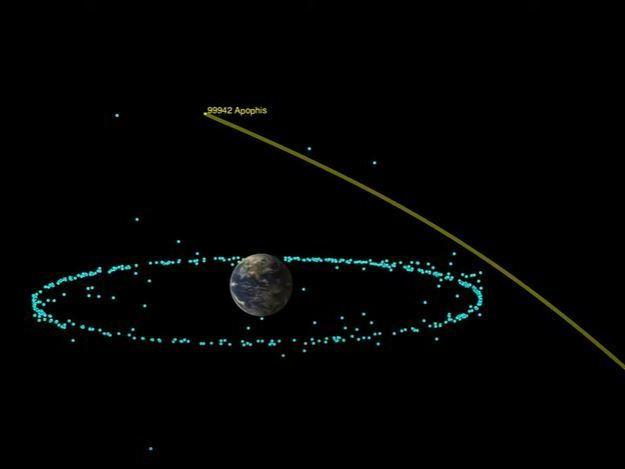Section Branding
Header Content
Asteroid Apophis Not A Risk To Earth For At Least 100 Years, NASA Says
Primary Content
Good news from NASA: Earth is safe from the dangerous asteroid 99942 Apophis for the next 100 years. So if you'd put this on your apocalyptic bingo card, you'll need to print new ones.
Apophis was first discovered in 2004, after which NASA says it was put on the list of most hazardous asteroids that could impact Earth.
A potential hit from the 1,100-foot asteroid could kill 10 million people, researchers said in early predictions.
Astronomers originally predicted that Apophis would get a little too close for comfort in 2029. Then in 2036. Both of those predictions were ruled out, but the latest prediction for 2068 still remained even though the risk of impact was small. That's no longer the case.
"A 2068 impact is not in the realm of possibility anymore, and our calculations don't show any impact risk for at least the next 100 years," said Davide Farnocchia of NASA's Center for Near-Earth Object Studies.
The latest predictions are the result of new radar observations that happened when Apophis came closer earlier this month. Though here "closer" was still a safe distance of 10.6 million miles away from Earth.
Astronomers also used the radar observations to make a more precise analysis of the asteroid's orbit around the sun.
"We were able to acquire incredibly precise information about its distance to an accuracy of about 150 meters," said scientist Marina Brozovic of NASA's Jet Propulsion Laboratory in Southern California.
Brozovic led the radar operations that ruled out any potential impact risk in 2068. Scientists hope to use the data collected this time to discover more about the shape of the asteroid, as well as its spin rate and the axis it spins on.
Though the risk for impact in 2029 was ruled out long ago, Apophis will come within 20,000 miles of Earth's surface that year on April 13. Observers in the Eastern hemisphere will have a chance to see it without binoculars, and astronomers have an opportunity to learn more about the asteroid, without the worry that it is still a risk to the planet.
"When I started working with asteroids after college, Apophis was the poster child for hazardous asteroids," Farnocchia said. "There's a certain sense of satisfaction to see it removed from the risk list, and we're looking forward to the science we might uncover during its close approach in 2029."
Copyright 2021 NPR. To see more, visit https://www.npr.org.

